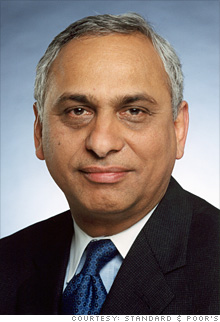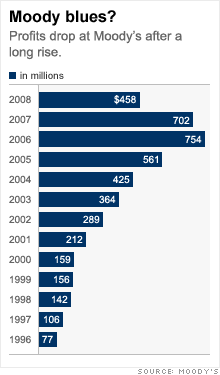Business as usual for Moody's and S&P
Ratings agencies played a substantial role in the market meltdown -- and real reform is a long ways off.
 |
| S&P chief Deven Sharma told Congress the firm was 'profoundly disappointed' in its poor ratings performance. |

NEW YORK (Fortune) -- What to do with Wall Street's gluttonous gatekeepers?
By all accounts, the major credit rating agencies -- Standard & Poor's, Moody's and their smaller rival Fitch -- played a significant role in inflating the credit bubble. The firms raked in huge fees by blessing bonds based on mortgages of poor quality. Then Wall Street dumped the highly rated bonds on suckers around the globe.
When homowners couldn't make their mortgage payments, the bonds turned toxic -- touching off a financial sector meltdown that that torched investors everywhere.
Washington has promised reform. But leading plans under discussion would do little to address two longstanding structural problems.
First, the firms earn most of their money taking fees from bond issuers, creating a thorny conflict of interest.
Second, investors and regulators use the ratings for everything from investing decisions to capital requirements -- yet the accuracy of the ratings isn't even officially tracked, much less subject to meaningful scrutiny.
So as regulatory reform season kicks into high gear, there is little sense that serious change is imminent.
"The role of a rating agency is to provide a fair, unbiased assessment of value in order to improve the efficiency of credit markets," Jerome Fons, a former Moody's managing director, told the National Association of Insurance Commissioners last month.
"But powerful interests prefer inefficient markets so that they can extract returns from the less informed," said Fons, who now runs a risk consulting business. "It takes heroic discipline to stand up to these interests, and in my view, for-profit rating firms are not up to the task."
To be sure, the rating firms stress that they aren't standing still. S&P notes that it has hired new executives and adopted new rules for rating housing-related securities and preventing conflicts of interest. Moody's has pointed out its efforts to improve transparency and boost ratings consistency.
The rating agencies have performed poorly many times before. Notably, they were just as tardy in flagging the problems at Enron and WorldCom in the downturn at the start of this decade as they were last year at Lehman Brothers and AIG.
Yet despite this uneven track record, the ratings firms' profits were growing at a rapid clip until the bottom fell out of the housing market.
Moody's (MCO) saw its profits grow sevenfold between 1997 and 2006, when U.S. house prices topped out. Financial services accounted for three-quarters of profits at S&P parent McGraw-Hill (MHP, Fortune 500) that year.
But the profit gusher at the major firms have eased off in recent years, as the financial markets teetered. And threats stemming from the loose practices of the go-go days are starting to emerge. Take a suit filed in July by Calpers, the giant pension fund.
The firm sued all three big rating agencies, blaming them for $1 billion in losses on debt issued by so-called structured investment vehicles, or SIVs, a favorite tool of Wall Street during the boom. The ratings agencies said the suit lacked merit.
Calpers claimed the rating agencies were negligent in giving high ratings to some bonds that have since gone sour. The suit also said the firms were "actively involved" in creating these questionable investments, arguing they "would help the arrangers structure their deals so that they could rate them as highly as possible."
The rating firms, without commenting specifically on the Calpers claims, reject the notion that they would ever cross the line into structuring or selling bonds.
"We don't structure deals -- our policy prohibits that," an S&P spokesman said. "We do not structure, design or market securities of any kind," Moody's said.
Still, some observers contend that the agencies' actions in structured finance may have compromised a favorite legal defense. The rating agencies say they are merely publishers, and that their ratings are opinions that are shielded by the First Amendment.
But with the lion's share of revenue coming from the firms whose bonds they rate, "Really they're more like vanity publishers," said Daniel Alpert, managing director at investment bank Westwood Capital. "There's no way the First Amendment defense will survive this wave of litigation."
If the current situation is less than satisfactory, the fixes being pursued on Capitol Hill and at the Securities and Exchange Commission are nothing to write home about either.
The Obama administration this summer called for new rules that would strengthen SEC oversight of the rating agencies and demand that they manage their conflicts of interest better. It also said rules should be rewritten to reduce investors' and regulators' reliance on ratings.
But that may be easier said than done. Americans got an inkling of that last fall after AIG faltered and was propped up with taxpayer funds that eventually ran to more than $180 billion.
AIG's Achilles heel turned out to be the billions of dollars of credit default swaps it wrote to help European banks reduce their capital requirements. In essence, the European banks paid AIG for triple-A ratings that allowed them to lend out spare funds rather than holding them against possible losses.
While the ratings agencies obviously didn't cause AIG's implosion, the insurer's woes show just how integral the big three firms have become to the financial system.
"The system has been set up to rely heavily on ratings," said Matthew Richardson, a finance professor at New York University. "It's hard to put that genie back in the bottle."
But if Washington hasn't come up with a workable fix yet, there's no reason to despair. There are plenty of proposals to change the so-called issuer-pays model and to improve the procedure for approving and overseeing nationally registered rating firms.
It may simply take a while for policymakers to sort through all of them, Richardson adds. After all, massive bank failures and funding crises have up till now taken priority.
"This was part of the crisis, but it wasn't the heart of the crisis," he said. "It's going to take some time to get this piece of the puzzle right." ![]()
-
 The retail giant tops the Fortune 500 for the second year in a row. Who else made the list? More
The retail giant tops the Fortune 500 for the second year in a row. Who else made the list? More -
 This group of companies is all about social networking to connect with their customers. More
This group of companies is all about social networking to connect with their customers. More -
 The fight over the cholesterol medication is keeping a generic version from hitting the market. More
The fight over the cholesterol medication is keeping a generic version from hitting the market. More -
 Bin Laden may be dead, but the terrorist group he led doesn't need his money. More
Bin Laden may be dead, but the terrorist group he led doesn't need his money. More -
 U.S. real estate might be a mess, but in other parts of the world, home prices are jumping. More
U.S. real estate might be a mess, but in other parts of the world, home prices are jumping. More -
 Libya's output is a fraction of global production, but it's crucial to the nation's economy. More
Libya's output is a fraction of global production, but it's crucial to the nation's economy. More -
 Once rates start to rise, things could get ugly fast for our neighbors to the north. More
Once rates start to rise, things could get ugly fast for our neighbors to the north. More







